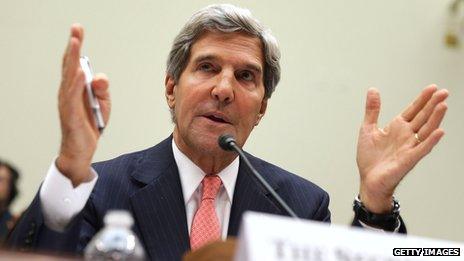Syria crisis: Senate resolution like Goldilocks' porridge
- Published

The committee voted for military action in Syria after hearing testimony from US Secretary of State John Kerry
The United States is a little further down the road towards action in Syria.
We cannot call it war, because Secretary of State John Kerry says it is not.
The Senate foreign relations committee has voted to authorise military action, by 10 votes to seven with one abstention.
If the committee mirrors its colleagues, President Barack Obama would win a narrow victory next week. But they may not be typical. It looks like it will be close.
The motion is a curious hybrid, which underscores the president's difficulty in selling his intended action. Like the porridge of the Goldilocks fairy tale, it can neither be too hot nor too cold, but just right.
The original motion was crafted to reassure those who are worried about an attack on Syria developing into something else. It limits action to an initial 60 days. It forbids combat troops on the ground.
But Senator John McCain, the doyen of hawkish use of American power, has long been worried that President Obama has done too little and has not set out how his "shot across the bows" could make a real difference in Syria.
He thinks the US should not just declare Syrian President Bashar al-Assad should go, but act to encourage that outcome.
So he added in words that stress that policy is to "reverse momentum on the battlefield", degrade President Assad's capabilities, and help the opposition, including giving them weapons.
I am not certain if, in the terms of the motion, this would only be for a couple of months.
But what senators will vote on does seem to both tie the president's hands and beef up the aims of America's action.
It could provide something for everyone. Or it could please nobody.
It is very hard to predict the outcome next week.
An ABC/BBC straw poll found that out of the 100 senators, 57 told us they had not made up their minds. Of those who talked and had made up their minds, the majority for action was 21 to 13.
That level of uncertainty should make the White House very nervous - and very active - in the next few days.